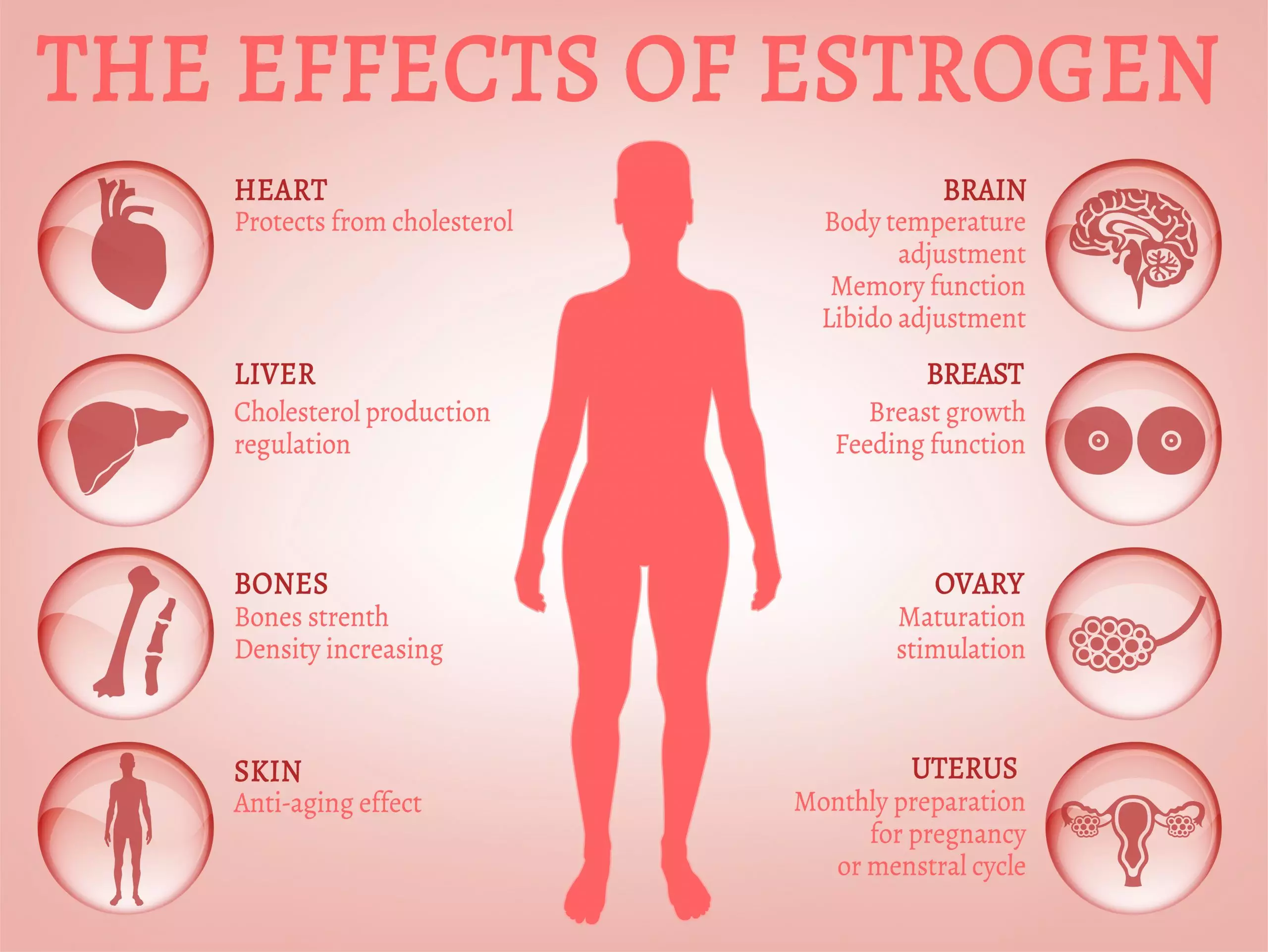Estrogen is Protective: Health Risks to Be Aware of After Menopause
We’re used to thinking of estrogen purely as a sex hormone, one that causes the development of female body traits, initiates menstruation, and enables pregnancy and childbirth. Those aren’t estrogen’s only functions, however.
Protective Benefits of Estrogen
Estrogen performs a host of protective tasks that affect nearly every organ and structure in your body, and when it recedes it doesn’t only lead to common menopausal symptoms like hot flashes and night sweats; it can also leave you more vulnerable to serious health concerns. By understanding more about what estrogen does, you are better able to take steps to address the risks, keep disease at bay, and maintain or even improve your quality of life in menopause.

This diagram shows the effects of the female estrogen hormone in the human body.
(This image is from Shutterstock.)
Estrogen Protects Your Heart
Research regarding the connection between estrogen, heart health, and menopause is ongoing, but consistent, strong evidence shows that the hormone protects your heart by:
- Keeping your cardiovascular tissue healthy
- Stabilizing your blood pressure
- Keeping your triglycerides (the main component of body fat) low,
- Increasing “good” HDL cholesterol and lowering “bad” LDL cholesterol
Studies have shown that the rate of heart disease increases in women who experience early natural menopause or who have both ovaries removed before the age of 45.
If you have a family history of cardiovascular disease, you might want to consult a heart specialist to assess your likelihood for developing a cardiac or circulatory condition, and be proactive in prevention or, if necessary, treatment.
Learn more about menopause
Stay informed with the latest news and ways to manage menopause.
Estrogen Protects Your Brain
About one-third of your brain is made up of blood vessels. The brain relies on blood flow as its sole source of the energy it needs in order to function. Estrogen protects your brain by:
- Helping maintain proper blood flow
- Fighting off inflammation
- Supporting fine motor skills and verbal memory
- Maintaining problem-solving, spatial awareness, and navigational abilities
Research also suggests that estrogen therapy may benefit cognitive function in women who do not have dementia, and that older women who use post-menopausal hormone therapy experience lower rates of death from Alzheimer’s disease.
Estrogen Protects Your Bones and Muscles
Estrogen helps protect against osteoporosis (porous, weak, and brittle bones) by stimulating the activity of “osteoblasts”–cells that produce the substance that creates new bone. Minerals from your bones are constantly being reabsorbed and replaced. As you lose estrogen, the reabsorption of old bone cells gradually outpaces the creation of new ones.
Estrogen also protects your connective tissue by:
- Increasing the collagen content of tendons and ligaments, reducing stiffness, and
- Developing and maintaining muscle mass and muscle strength.
A University of Minnesota study found that, in female bodies, stem cells (also called ‘satellite cells’) found in skeletal muscles are the ones that produce new muscle following an injury. These stem cells need estrogen to reproduce and function properly. Without it, muscle cells atrophy and die off. Weight-bearing exercise, mineral supplements, and hormone replacement therapy (HRT) are common ways of protecting your bones and muscles after menopause.
Estrogen Protects Your Vagina and Urinary Tract
Estrogen plays a vital role in keeping your vaginal tissue stretchy and lubricated. When estrogen levels recede, the walls of your vagina can become thin, dry, and inflamed, and lose their elasticity. As a result, the tissue is more fragile and can tear easily. Open wounds are vulnerable to infection. These changes can cause general discomfort, pain during sex, and issues with urination. Some symptoms include:
- Itching and/or burning sensation in or around your vagina
- Pain or discomfort during sex, and bleeding after sex (usually light)
- Vaginal discharge
- Urgency to urinate, more frequent urination, and urinary incontinence
- Burning sensation when urinating
- Frequent urinary tract infections
Smoking, infrequent sex, and not having given birth vaginally can worsen these issues. Regular sexual activity, with or without a partner, increases blood flow to your vagina and can help keep the delicate tissue healthy.
Estrogen Can Affect Your Mood
Since estrogen affects your brain, it can also affect your mood. Estrogen acts on your central nervous system, and influences:
- Regulation of certain neurotransmitters:
- Serotonin (the ‘feel-good hormone’)
- Dopamine (involved in feelings of pleasure and reward)
- Epinephrine/adrenaline and norepinephrine (both involved in the ‘fight, flight, or freeze’ response)
- Fluctuation of hormone levels in the amygdala
- Stimulation of mood-related activity in the hippocampus
If you are particularly sensitive to changes in your hormone levels, you may be more prone to depression as your estrogen declines. Monitor your mood, note any changes in a journal, and consult your healthcare provider if your mood swings interfere with your daily life.
Speak with your doctor openly about your personal and family health history, and voice any concerns you have about your current and future physical and psychological health. Many of the symptoms and conditions discussed above are manageable with a combination of medical treatments and change of lifestyle habits.

